Results 1 to 5 of 5
Thread Information
Users Browsing this Thread
There are currently 1 users browsing this thread. (0 members and 1 guests)
-
05-01-2014, 08:23 PM #1Senior Member


- Join Date
- May 2007
- Location
- South West Florida (Behind friendly lines but still in Occupied Territory)
- Posts
- 117,696
People who live in these states are the most eager to get the hell out.

People who live in these states are the most eager to get the hell out.
That's funny. I had a very strong desire to move out of Texas. (via)The map above shows results from a Gallup poll from the second half of last year, revealing how...
happyplace.someecards.comJoin our efforts to Secure America's Borders and End Illegal Immigration by Joining ALIPAC's E-Mail Alerts network (CLICK HERE)
-
05-01-2014, 08:25 PM #2Senior Member


- Join Date
- May 2007
- Location
- South West Florida (Behind friendly lines but still in Occupied Territory)
- Posts
- 117,696
People who live in these states are the most eager to get the hell out.
MAPS
posted 2 hours ago
Tags: Gallup, Poll, States, Move, Map, Illinois, Connecticut, Funny
The map above shows results from a Gallup poll from the second half of last year, revealing how much residents of every state desire to move. Illinois, Connecticut, and Maryland top the charts, with about 50% of residents of these states wanting out. Coincidentally, they all also seem like relatively nice places to live. Maybe that's how they get you.


That's funny. I had a very strong desire to move out of Texas. (via)
At the opposite extreme, residents of these six states had the lowest inclination to pull up roots and start over in another state: Texas, Montana, Hawaii, Maine, Oregon, and New Hampshire. This result makes way more sense to me. Texans are obsessed with Texas. There's like five people in Montana. Why would anyone want to leave Hawaii? Maine and New Hampshire are like the weird, northeast version of Texas. And Oregon is mostly trees, which don't move around much.
Anyone want to speak up on behalf of poor, unloved Illinois? Is the problem all the corn?
(by Shira Rachel Danan)
A bunch of British people drew a suspiciously accurate map of U.S. stereotypes
[ Via Gallup, h/t Vox ]
http://happyplace.someecards.com/310...e-want-to-moveJoin our efforts to Secure America's Borders and End Illegal Immigration by Joining ALIPAC's E-Mail Alerts network (CLICK HERE)
-
05-01-2014, 08:27 PM #3Senior Member


- Join Date
- May 2007
- Location
- South West Florida (Behind friendly lines but still in Occupied Territory)
- Posts
- 117,696
Half of Illinois Residents Would Leave the Land of Lincoln (If They Could)
May 1, 2014 - 1:56 PM

By Craig Bannister
Subscribe to Craig Bannister RSS
Follow Craig Bannister on Twitter
Half the residents of Illinois (50%), Connecticut (49%) and Maryland (47%) would flee their state if they had the chance, a new Gallup Poll show.
Residents of these states are also the most likely to leave, and Gallup attributes three factors:
- State taxes
- State Government
- Quality of Life
"Nevada, Illinois, Maryland, Louisiana, Mississippi, New York, and Connecticut all appear particularly vulnerable to losing population in the coming few years: high percentages of their residents say they would leave if they could, and larger-than-average percentages say they are at least somewhat likely to do so in the coming year. At the other end of the spectrum, Texas, Minnesota, and Maine have little to fear. Residents of these states are among the least likely to want to leave and few are planning to leave in the next 12 months.Conversely, just under a quarter of people living in Montana, Hawaii, Maine, Oregon, New Hampshire and Texas would leave, given the opportunity.
"If these states sound familiar to readers of Gallup's previous 50-state poll articles, it's because several of them also appear at the top or bottom of the states for resident satisfaction with state taxes, state government, and overall perceptions of how their state compares to others as a place to live. Texas is in the top 10 on all three, while Illinois, Rhode Island, and Maryland rank in the bottom 10 on all three."
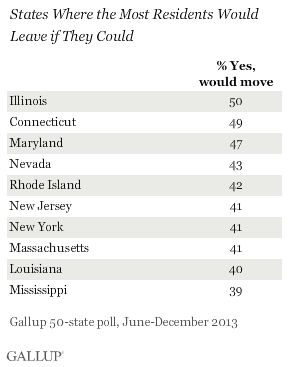
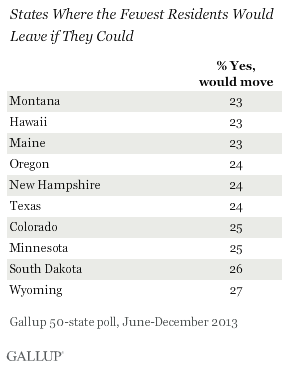
http://cnsnews.com/mrctv-blog/craig-...-if-they-couldJoin our efforts to Secure America's Borders and End Illegal Immigration by Joining ALIPAC's E-Mail Alerts network (CLICK HERE)
-
05-01-2014, 08:28 PM #4Senior Member


- Join Date
- May 2007
- Location
- South West Florida (Behind friendly lines but still in Occupied Territory)
- Posts
- 117,696
Half of people living in Illinois and Connecticut want to get the hell out
Updated by Danielle Kurtzleben on April 30, 2014, 6:15 p.m. ET @titonka danielle@vox.com
Tweet Share
 Not every Chicagoan is as happy as this kid. Half of Illinoisans say they'd get out if they could. Getty Images
Not every Chicagoan is as happy as this kid. Half of Illinoisans say they'd get out if they could. Getty Images
Follow Vox!
New data is out on the states people want to leave, and it's tailor-made to troll all your Facebook friends from Illinois and the northeastern Amtrak corridor.
Gallup asked people around the country whether they would move away from their states, given the chance. As it turns out, half of Illinois residents and 49 percent of all Connecticutians (Connecticutese? Connecticuters?) want to change states. In addition, it looks like a good chunk of the northeastern seaboard is just itching to pack up a U-Haul.
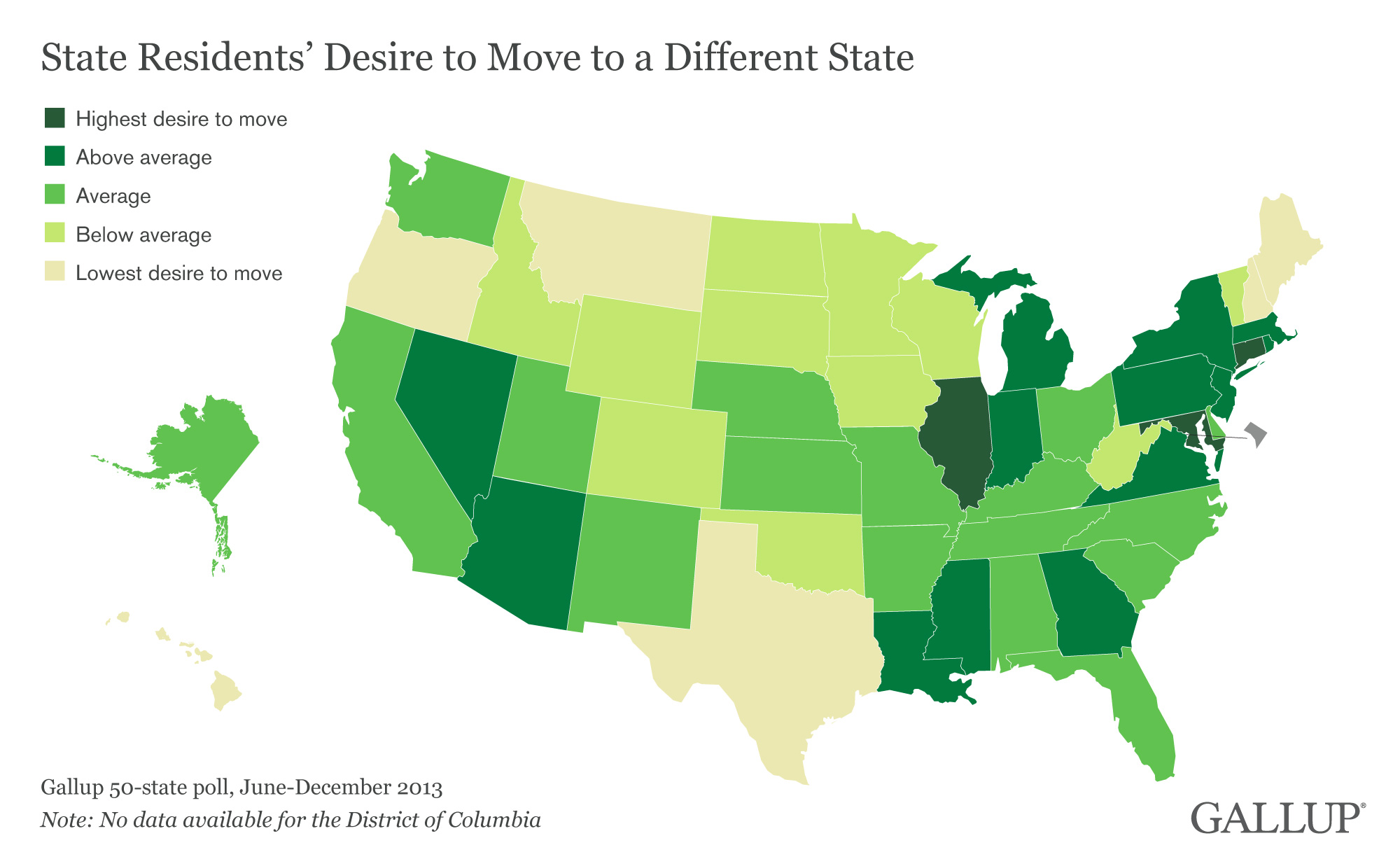
Montanans, Hawaiians, and Mainers are least likely to say they'd want to leave, with fewer than one-quarter of those residents saying they'd move. Altogether, only 33 percent of all Americans surveyed said they'd leave their current states.

Meanwhile, in nine states, 40 percent or more of the people want to get out, including around half of all Illinoisans, Marylanders, and Connecticuterians.
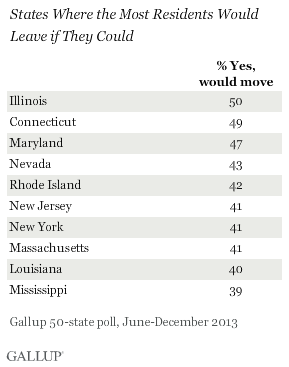
It's fascinating data, and if you're from the relatively content upper plains, you can feel comfortably superior. If you're from one of those dark green states, you can shake your fist at the sky in anguish.
Or you can just, you know, get out.
All these people say they would leave if they could, but far fewer actually will, which might in a certain sense be good — imagine the epic moving-box and bubble-wrap shortage if one-third of all Americans moved to a new state.
But only six percent of all people said they were either very or extremely likely to change states in the next year, and even that is higher than the number of people who will likely move. That share of people who as of July 2013 were in a different state from a year ago was around 1.5 percent.
That's a much lower share than it used to be. Interstate migration has fallen in a big way over the last twenty years. A 2013 paper from the Federal Reserve Bank of Minneapolis showed this.
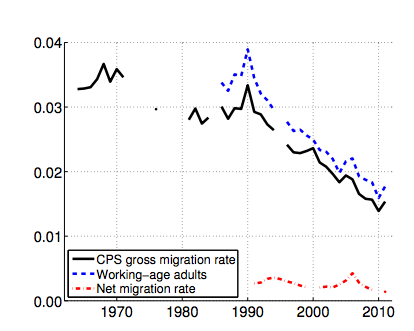
Thanks to those unsightly gaps, the chart isn't perfect, but it clearly shows that the gross interstate migration rate — the black line showing the share of the US population that shifted from state to state in any given year — fell by roughly half, from almost 3 percent to around 1.5 percent, between 1990 and 2011.
Americans have stopped changing states, and that may be a very bad thing. During and just after the recession, the ever-dropping moving rate made everyone wring their hands: a collapsed housing market and a profound lack of jobs both contributed to and resulted from a lack of migration.
When there are no jobs anywhere, after all, people have less of a reason to move. And when the housing market is stagnant, people can't go get the jobs that do happen to pop up. In other words, the would-be factory worker who can't sell her house in Memphis to move to Cincinnati, where there are jobs, can't get that job and spend that paycheck and create more jobs. Or maybe that person just wants to wait for housing prices to pick back up again before selling.
Because of this, it could be both a promising sign and an economic booster if Americans start to move more; notably, a lot of the states people say they'd least like to leave also have low jobless rates, and people who would most like to leave are often in states where the jobless rate is high.
Plus, among Americans who say they plan to leave their states, the most common reason given was work- or business-related — a reason given by 31 percent of respondents. Different states, however, had different mixes of reasons; New York, Illinois, and Maryland residents all cited taxes as a key reason. New York and Connecticut residents were also significantly more likely to cite a high cost of living.
All that said, there's another story about why people are staying put, and it's not about recessions. After all, the decline in mobility started way before the recession. Rather, it may be all about a more homogeneous US economy, not to mention the internet and cheap travel.
The economists who made that above chart, Greg Kaplan and Sam Schulhofer-Wohl, argued that the decline in moving in part happened because US jobs got less geographically specific, as they put it. Translated, that means it's easier than it used to be to find a lot of the same sorts of jobs across a lot of different cities, as the Economist noted in 2012. A shift away from the goods-producing sector to services has helped this happen. Common services jobs, like healthcare and waitressing, can be done anywhere. But a lot of goods-producing jobs (manufacturing, mining, logging) have to be done in particular places (i.e. wherever the factories, mines, or trees are).
Likewise, there's now more fluid information. People can easily look up places they might want to live. This could also be a factor that keeps people in place — they can research and hem and haw over a move, rather than crossing their fingers and driving across the country.
All of which may mean that even if Illinoisans and Connectici and really anyone else is just sick of their state, they're less likely to do anything about it than they were 20 years ago. The question of whether that's a good or bad thing remains a mystery.
http://www.vox.com/2014/4/30/5668588...igration-ratesJoin our efforts to Secure America's Borders and End Illegal Immigration by Joining ALIPAC's E-Mail Alerts network (CLICK HERE)
-
05-06-2014, 02:19 AM #5Senior Member


- Join Date
- May 2007
- Location
- South West Florida (Behind friendly lines but still in Occupied Territory)
- Posts
- 117,696
Half Of Illinois Wants To Live Elsewhere (But Nevadans Are The Most Anxious To Leave)
 Submitted by Tyler Durden on 05/04/2014 15:34 -0400
Submitted by Tyler Durden on 05/04/2014 15:34 -0400
While every state has at least some residents who are looking for greener pastures; as Gallup reports, nowhere is the desire to move more prevalent than in Illinois and Connecticut. In both of these states, about half of residents say that if given the chance to move to a different state, they would like to do so (against an average 33% of all Americans who would prefer to live in another state than their own). The 'greenest pasture' or least disliked, according to Gallup, is Hawaii and Montana (where only 23% would prefer to leave). The biggest factor driving the desire to leave the current state - unsurprisingly - jobs (or business opportunities)... and Nevada residents (thank you Harry Reid) the most anxious to leave in the next 12 months.
Via Gallup,
These findings are from a 50-state Gallup poll, conducted June-December 2013, which includes at least 600 representative interviews with residents aged 18 and older in each state. Gallup measured residents' interest in moving out of state by asking, "Regardless of whether you will move, if you had the opportunity, would you like to move to another state, or would you rather remain in your current state?"

Thirty-three percent of residents want to move to another state, according to the average of the 50 state responses. Seventeen states come close to that 50-state average. Another 16 are above the average range, including three showing an especially high desire to move. In fact, in these three -- Illinois, Connecticut, and Maryland -- roughly as many residents want to leave as want to stay.
At the other end of the spectrum, 17 states are home to a below-average percentage of residents wanting to leave. This includes the previously mentioned six states -- Montana, Hawaii, Maine, Oregon, New Hampshire, and Texas -- where fewer than one in four want to move, the lowest level recorded.

In the same poll, Gallup asked state residents how likely it is they will move in the next 12 months. On average across all 50 states, 6% of state residents say it is extremely or very likely they will move in the next year, 8% say it is somewhat likely, 14% not too likely, and 73% not likely at all.
The combined percentages reporting they are extremely, very, or somewhat likely to move out of state ranges from 8% in Maine, Iowa, and Vermont to 20% in Nevada.

With the biggest motivating factor to leave being work/jobs...

As Gallup concludes,State leaders have important reasons for wanting to see their state populations grow rather than shrink. A growing population usually means more commerce, more economic vitality, and a bigger tax base to pay for state services. A shrinking population not only hurts government coffers, but can weaken a state politically by virtue of the potential loss of U.S. House members through redistricting every 10 years.
...
Nevada, Illinois, Maryland, Louisiana, Mississippi, New York, and Connecticut all appear particularly vulnerable to losing population in the coming few years: high percentages of their residents say they would leave if they could, and larger-than-average percentages say they are at least somewhat likely to do so in the coming year. At the other end of the spectrum, Texas, Minnesota, and Maine have little to fear. Residents of these states are among the least likely to want to leave and few are planning to leave in the next 12 months.
If these states sound familiar to readers of Gallup's previous 50-state poll articles, it's because several of them also appear at the top or bottom of the states for resident satisfaction with state taxes, state government, and overall perceptions of how their state compares to others as a place to live.
http://www.zerohedge.com/news/2014-0...-anxious-leaveJoin our efforts to Secure America's Borders and End Illegal Immigration by Joining ALIPAC's E-Mail Alerts network (CLICK HERE)


 LinkBack URL
LinkBack URL About LinkBacks
About LinkBacks




 Reply With Quote
Reply With Quote


Illegal immigration is costing American hospitals billions of...
04-27-2024, 07:55 PM in General Discussion